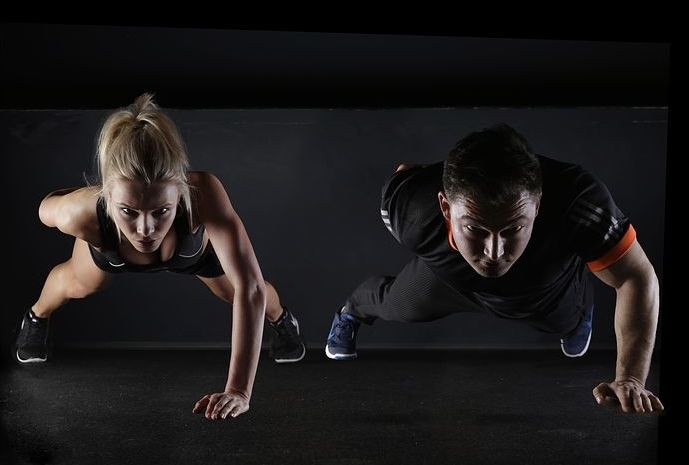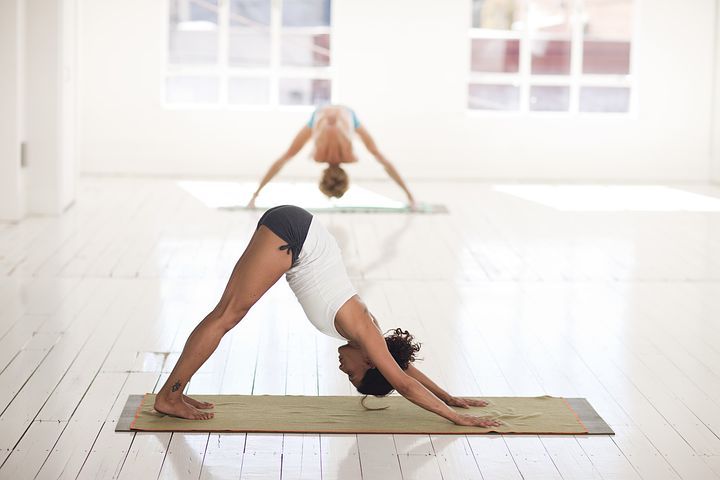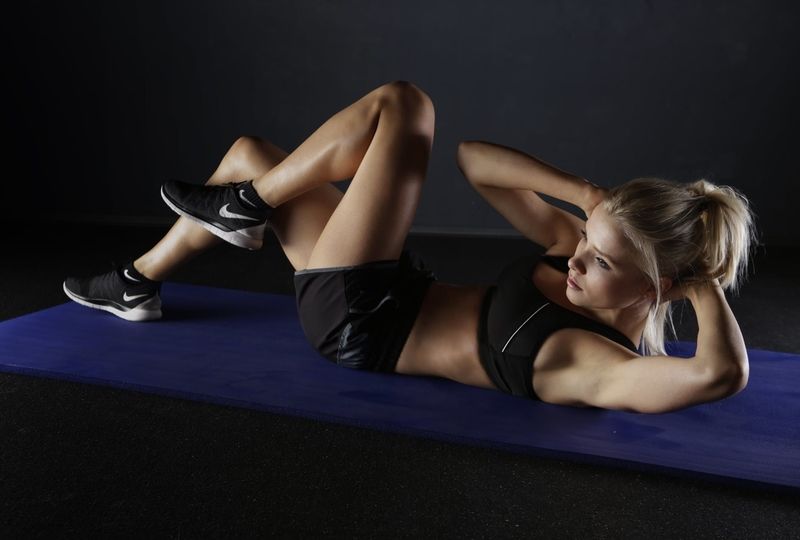Top 20 Workout Words You Need to Know in German

If you enjoy working out, you know all of the keywords and phrases that go with it.
As you get more familiar with German, you will start to see that they have their own workout lingo as well. From the different words to entire phrases, there is a lot of vocabulary you can learn that pertains to exercise. Whether you work out on your own or with a language partner, practicing some words will help you to more quickly learn German.
One of the best things about combining your exercise routine with learning German is that you can build practicing the language into your existing routine. For example, you can quickly learn how to count in German as you do reps. You can also focus on each of the parts of your body that you are working, thinking of that body part by its German name.
Whether you are aiming to discuss your ab workouts or just want to ask where the exercise bike is, there is plenty of exercise specific vocabulary. To get you started, the following are the top German workout phrases and key words, and how you can incorporate them into regular use.
This article gives you the top 15 workout words you should know to workout. It also provides five phrases that you can use with most of your workouts to start using German with others.
How to Use German Words in Your Workouts
As excited as you may be to start using German in your workouts, there are a few simple guidelines to help you get the most out of your new vocabulary.
When you first start using German in your workout routine, stick with the easy vocabulary. Don’t dive in and try to use phrases. Instead, work with the easy words. You’ve likely already learned some body parts. Even better, you can use your workout to really practice German numbers.
Get to the point where you feel you have mastered these vocabulary terms before you move into the exercise specific words and phrases. Since these kinds of words are easy to use in other parts of your daily life, this probably won’t take too long.
Once you are confident with these words, move to the exercise specific vocabulary. Don’t jump to the phrases just yet. Spend a week or two getting accustomed to thinking of a particular exercise or piece of equipment by its German term.
Write down all of the terms on flashcards, then select the ones you plan to use that week. When you aren’t working out, go over the flashcards to enhance your memorization of those terms.
Make sure you continue to count your reps in German. This reinforces the idea of exercising using your new German vocabulary as you are already thinking in German.
At least once a week, write the exercise terms and eventually phrases you know in German. Expand on this by writing short dialogues using those terms. By thinking about how to use your vocabulary with others, you will find it much easier to do when the time comes. German speakers will be more than happy to correct you and help you if you aren’t saying something quite right.
Since it is less likely that you will encounter German speakers at the gym, see if your language partner is willing to help. Even if they don’t dedicate as much time to exercise as you, a lot of the terms are well known. You don’t have to go to a gym to know the terms yoga, dumbbell, or exercise bike.

20 Workout Words You Must Know in German
Taking these tips, here are 20 words, divided into two categories to help you know when to use them.
The following are 8 general words that you can use at any point during your exercise routine.
| 1. Breathe | atmen |
| 2. Exercises | die Übungen |
| 3. To Exercise | ausüben (usually used for practice), exerzieren (usually used for workout exercises) |
| 4. To Relax | sich ausruhen |
| 5. Strength | die Kraft |
| 6. Sweat | schwitzen |
| 7. Tired | müde |
| 8. Training | das Training |
These 12 words are exercises that you will probably use.
| 9. Barbell | die Langhantel |
| 10. Dumbbell | die Hantel |
| 11. Exercise Ball | der Gymnastikball |
| 12. Jogging | das Joggen |
| 13. To Jog | mühsam gehen |
| 14. Punching bag | der Boxsack |
| 15. Push Up | der Liegestütz |
| 16. Pull Up | der Klimmzug |
| 17. Squat | Kniebeugen |
| 18. To Stretch | dehnen |
| 19. Yoga | das Yoga |
| 20. Yoga Mat | die Yoga Matte |
One advantage you have to learning German is that you are more likely to encounter words that are either the same or very similar between the two languages. Even the words that aren’t the same will appear repeatedly, making it easier to remember specific vocabulary.
For example, the word training is the same, reguardless of what kind of training you are doing. That means, you only have to learn the word for a specific type of training, such as strength training.
Bonus:
| Breathing exercises | die Atemübung |
| Strength training | das Krafttraining |
| Weight training | das Gewichtstraining |

Quick Refresher on German Numbers
Since we've recommended that you use numbers while you do your reps, here is a quick refresher on the numbers you are most likely to need.
| 1 | eins |
| 2 | zwei |
| 3 | drei |
| 4 | vier |
| 5 | fünf |
| 6 | sechs |
| 7 | sieben |
| 8 | acht |
| 9 | neun |
| 10 | zehn |
| 11 | elf |
| 12 | zwölf |
| 13 | dreizehn |
| 14 | vierzehn |
| 15 | fünfzehn |
| 16 | sechzehn |
| 17 | siebzehn |
| 18 | achtzehn |
| 19 | neunzehn |
| 20 | zwanzig |
| 21 | einundzwanzig |
| 22 | zweiundzwanzig |
| 23 | dreiundzwanzig |
| 24 | vierundzwanzig |
| 25 | fünfundzwanzig |
| 30 | dreisszig |
| 40 | vierzig |
| 50 | fünfzig |
| 60 | sechnzig |
| 70 | siebzig |
| 80 | actzig |
| 90 | neunzig |
| 100 | hundert |
Focus on learning one through 10 if you are shaking. The rest of the counting stems from these first ten numbers. After that, learn to count by 10s. Once you know both of these, it is incredibly easy to count in German.
Make sure to practice counting in German every time you do reps. This alone will help you program your brain to think in German for at least part of your day.

Learn the Metric System
If you spend most of your workouts running, biking, or hiking, you will want to be able to gauge your distance in kilometers – all German speaking people use the Metric System.
Most workout apps give you a choice to choose Metric or Standard. If you currently have yours set to Standard, go ahead and make the switch to the Metric System.
If you don’t exercise outside with a device, you can convert the distances displayed to the Metric System. The Fibonacci Method is the easiest way to do this. Essentially, use a sequence that is the sum of the two previous numbers.
1 = 0+1
2 = 1+1
3 = 1+2
If your path includes mile sign posts, you can use this to quickly convert your distance. This not only help you to think in German more often, it gives your brain a bit of a math workout too.
If you aren’t looking for anything too exact, you can also use the following for a quick reference:
3 miles is approximately 5 kilometers.
6 miles is approximately 10 kilometers.
9 miles is approximately 15 kilometers.

Top 5 Workout Phrases in German
Of course, the best way to use the words is in phrases. These are always a little bit different in other languages. To help you start putting these words to use, here are a few German exercise phrases.
1. Can you spot/help me?
Kannst du mir beim X helfen? (X represents the exercise you would like the person to help you complete)
2. Enjoy your workout
Trimmeinheit.
3. How many more sets do you have?
Wie viele Sätze hast du noch?
4. That’s enough for today.
Das ist genug für heute.
5. How many days do you exercise a week?
Wie viele Tage trainierst du pro Wocke?
Bonus:
As with exercising, sometimes a few positive phrases can help to keep you motivated. Here are some to keep in mind if you feel that you need a little boost in your learning.
It doesn’t get easier. You get stronger.
Es wird nicht Leichter. Du wirst stärker.
You can do it.
Du shaffst das.
Never give up!
Gib niemals auf.
You only lose once you stop trying.
Du hast erst verloren, wenn du aufhörst es zu versuchen.

Exercising Your Body and Mind to Learn German
When you first started exercising, you probably began without doing much thinking because you figured you knew what you needed to do. This can end up making it more difficult to continue to work out later, especially if you get hurt.
Learning a language is somewhat similar. That initial enthusiasm can give you a boost in the beginning, but after the initial surge, you won’t see improvement at the same pace. You will need to plan to keep studying so that you can improve.
Think of other areas of your life where you can incorporate German. By committing to learning German through the mundane routines of each day, it will be much easier to commit to it over the long term. Even if you don’t feel like you are learning quickly, by using German daily you will still see progress.
